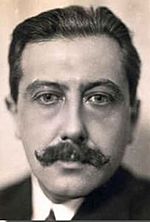Georges Bernanos facts for kids
Quick facts for kids
Georges Bernanos
|
|
|---|---|
 |
|
| Born | Louis Émile Clément Georges Bernanos 20 February 1888 Paris, France |
| Died | 5 July 1948 (aged 60) Neuilly-sur-Seine, France |
| Occupation | Writer |
| Period | 20th century |
| Genre | Novel |
Georges Bernanos (born February 20, 1888 – died July 5, 1948) was a famous French author. He was also a brave soldier during World War I.
Bernanos was a Catholic and believed in having a king (a monarchist). He often spoke out against ideas that he felt were unfair or led to giving up. He thought these ideas caused France to be defeated and taken over by Germany in 1940 during World War II.
His two most important novels are "Sous le soleil de Satan" (1926) and "Journal d’un curé de campagne" (1936). Both books are about a village priest who fights against bad things and sadness in the world. Many of his books have been translated into English. They are often published in both Great Britain and the United States.
Contents
Georges Bernanos: His Life Story
Early Life and War Hero
Georges Bernanos was born in Paris, France. His family worked as craftsmen. He spent a lot of his childhood in a village called Fressin. This village later became a common place for his stories to happen.
He joined the army and fought in the First World War. He took part in big battles like the Somme and Verdun. He was hurt several times during the war.
Becoming a Writer
After the war, Bernanos worked in insurance for a while. Then, he started writing. His first major novel was Sous le soleil de Satan (Under the Sun of Satan), published in 1926.
He won a special award, the Grand Prix du roman de l'Académie française, for his book The Diary of a Country Priest (Journal d'un curé de campagne). This book came out in 1936.
His Views on War and Politics
When he was younger, Bernanos supported the idea of a king ruling France. He was part of a youth group called the Camelots du Roi. However, he later disagreed with their leader in 1932.
At first, he supported Francisco Franco when the Spanish Civil War began in 1936. But after seeing the war in Mallorca, he became very upset. He saw how people were being scared and hurt. He then wrote a book called Diary of My Times (1938). In it, he said his support for Franco did not last long. He was disgusted by some of Franco's actions and followers.
Life in South America
As tensions grew in Europe, Bernanos and his family moved to South America in 1938. They settled in Brazil and stayed there until 1945. He even tried to manage a farm there.
When World War II started, his three sons went back to France to fight. Bernanos was very angry about France's defeat in 1940. He felt his country had lost its spirit. From Brazil, he made fun of the French government that worked with Germany (the Vichy regime). He strongly supported the Free French Forces, led by Charles de Gaulle. These forces fought against the German occupation.
After France was freed, Charles de Gaulle asked Bernanos to come back home. He even offered him a job in the government. Bernanos did return to France. However, he felt that France had not truly changed or found its spirit again. So, he decided not to be involved in French politics.
Famous Books by Bernanos
Here are some of Georges Bernanos's most well-known books and their English titles:
- Sous le soleil de Satan (1926)
- Under the Sun of Satan.
- L'Imposture (1927) and La Joie (1928)
- Joy.
- The Impostor.
- Un crime (1935)
- The Crime.
- Journal d'un curé de campagne (1936)
- The Diary of a Country Priest.
- Nouvelle histoire de Mouchette (1937)
- Mouchette.
- Les grands cimetières sous la lune (1938)
- A Diary of My Times.
- Monsieur Ouine (1943)
- Monsieur Ouine.
- Dialogues des carmélites (1949)
- The Fearless Heart.
- Un mauvais rêve (published after his death in 1950)
- Night Is Darkest.
Bernanos's Books on Screen and Stage
Many of Georges Bernanos's works have been turned into films or plays.
- The Diary of a Country Priest: This book became a film in 1951. It was also called Diary of a Country Priest and was directed by Robert Bresson.
- Mouchette: This novel was made into a film in 1967, also directed by Robert Bresson.
- Under the Sun of Satan: This book became a French film in 1987. It won a major award, the Palme d'Or, at the 1987 Cannes Film Festival.
- Dialogues des Carmélites: Bernanos wrote this as a play. It was based on a story about nuns who were executed in 1794. The play was first performed in 1952. A famous composer, Francis Poulenc, turned it into an opera in 1957. There was also a film based on the play in 1960.
See also
 In Spanish: Georges Bernanos para niños
In Spanish: Georges Bernanos para niños

